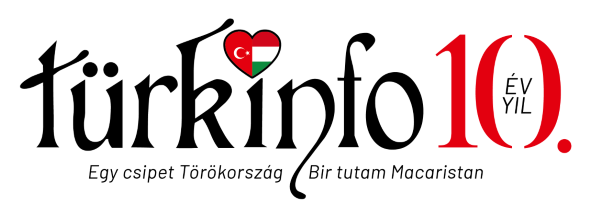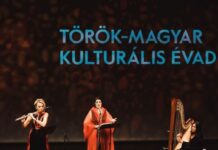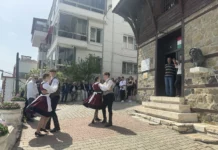Çiğdem Aslan an Istanbul-born singer of Kurdish origin comes to Hungary for the first time to perform a concert in Palace of Arts (Művészetek Palotája) on 13 of May. Her repertoire is colourful, she performs Rembetiko as well as Sephardic and Arabic music and folk songs from different regions of Anatolia. Çiğdem Aslan was invited by Bea Palya the renowned Hungarian folk singer to sing together on the stage to enchant the Hungarian audience. The concert will be the first in a concert series called „My silks”(Selymeim). The concept comes from Bea Palya who invites one famous musician from all around the world to each concert to sing with.
In Hungary, Greek music is represented by traditional folk music and some pop songs mostly. Rembetiko genre is not widespread; we don’t know much about it. In this interview I aim to familiarize the Hungarian audience with it. First of all, please tell me your first encounter with it, why have you chosen to sing Rembetico? Was it the beauty of the melody, the lyrics, or the daring and insolence expressed in the lyrics?
I started singing Rembetiko/ Smyrneiko (we can say Smyrneiko is the origin of Rembetiko) after I joined the music band of Istanbul University whilst studying English Literature. The band was working on a project of highlighting the ethnic richness & diversity of Anatolia, hence collecting and performing traditional songs in different languages; Rembetiko songs in Greek, folk songs in Kurdish, Armenian, Sephardic, Arabic, Alevi songs in Turkish, etc. That’s how it all started. It was my part to focus on Remebtiko but also sing in the other languages mentioned. When I look back at those times I remember how singing in these languages didn’t feel strange to me; it was as if I was unlocking a code to my own culture. The sounds, styles are born or prevailed in the same region interacting with each other.
A more personal question: for you, was it an issue of personal freedom, too? Were you encouraged by those closest to you or you had to stand up for yourself?
Well, singing was something very natural in my daily routine as my culture (Alevism) depends very much on oral traditions like storytelling, poems, music…And the project itself aimed at focusing on the existence of these assimilated, oppressed cultures so of course it was also personal for me to be able to pass my tradition on as well as the other cultures mentioned. I was however encouraged a lot by my very close friend Meral Harmanci to join the band, after which almost everything in my life changed for better.
In patriotic societies like Greek and Turkish, to be a Rembetiko singer used to be a brave and individualist move as it used to be kind of rebellious music, even prohibited for a period of time. How has its political hue changed since then? Has it become a music genre without the need to touch on more sensible issues?
Remebetiko was considered as the music of the lower class but it was not directly political to begin with.The first Rebetiko songs mainly were about the ‘criminal activities’ or love affairs. Yes it is rebellious as you find the elements of drugs, crime, misfits to the society, etc in the songs.
This changed a little bit during the dictatorship years of course and composers started referring to political issues as well. For example there is a song called ‘Νύχτωσε χωρίς φεγγάρι / Nychtose Choris Feggari/ Moonless Night’ written in late 1940s by Apostles Kaldaras, about a political prisoner. The lyrics say:
Night has fallen, moonless night
and the dusk is pitch black dark
yet a young man in his cell is
unable to fall asleep…
Are there new songs written on the base of the living tradition, or there are only those written in the past?
This is a subject open to a long discussion and study but for lots of people who know and love Rebetiko, the genre died by 1950s and became something else. I am one of those so I think although there are songs written after 1950s on the base of the style they are not Rebetiko for me.
You are giving concerts all around Europe; Rembetico has it renaissance today. What do you think, why is it so popular?
I am very happy to be introducing the sounds and stories of an era and region to those who are not familiar with it. We live in a world where people are more mobile than before; you have people from all around the world living or travelling everywhere and taking their culture with them. And of course eventually it evokes curiosity. I think this is partly what made it popular nowadays. People are curious about the stories of the genre and especially Piresus style Rembetiko has more Western elements in it so is more accessible to the audience in Europe.
You will sing in Hungary on 13 of May with Bea Palya. Have you ever sung for Hungarian audience before?
I haven’t sung for Hungarian audience before and am very much looking forward to performing in Budapest and singing with Bea Palya on 13th May. I hope they will like me!
Do you know our traditional folk music? Do you like it? How does it sound to you?
I have listened to Hungarian folk music and have read about it also – not in great detail though. I really like the fact that Hungarian music has so many different strong aspects from folk/gypsy folk music to Táncház and classical music. I’ve been listening to Márta Sebestyén, Bea Palya, Herczku Ágnes, Mitsoura and Kálmán Balogh – who I performed once in the UK. Hungarian folk music is slightly different from Anatolian music in terms of scales and instrumentation but still not too distant. I enjoy listening to it a lot.
And of course I know about Béla Bartók who contributed to Turkish music…
Art is not just a special way of self-expression, it is a mission as well. If you have to put it in words, what would be your motto? What is your mission?
Well for me music is a journey and it doesn’t hold any boundaries. And as Paul Hindemith said
“People who make music together cannot be enemies, at least while the music lasts.”
Erika Kertész – Türkinfo





























